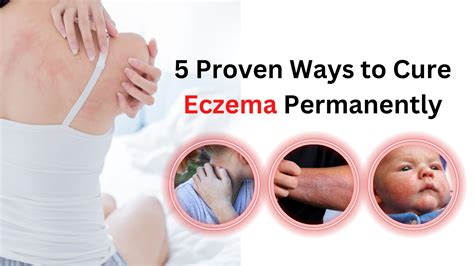How To Cure Eczema Permanently: A Holistic Approach
Eczema, also known as atopic dermatitis, is a chronic inflammatory skin condition characterized by itchy, dry, and inflamed skin. While a permanent "cure" remains elusive, managing and significantly improving eczema symptoms is achievable through a multifaceted approach. This article explores holistic strategies to help you effectively control your eczema and dramatically reduce its impact on your life. Remember, consulting a dermatologist is crucial for diagnosis and personalized treatment plans.
Understanding Eczema Triggers
Before diving into treatment, understanding what triggers your eczema is vital. Common culprits include:
- Allergies: Food allergies (dairy, eggs, nuts), pollen, pet dander, and dust mites can exacerbate eczema symptoms. Identifying and avoiding these allergens is crucial.
- Irritants: Harsh soaps, detergents, fragrances, and certain fabrics (wool, synthetic materials) can irritate the skin. Opting for gentle, fragrance-free alternatives is key.
- Stress: Stress significantly impacts the immune system, often worsening eczema flares. Stress management techniques are essential for long-term control.
- Climate: Dry, cold weather can worsen eczema. Maintaining proper hydration, both internally and externally, is vital.
- Infections: Bacterial or viral skin infections can complicate eczema, requiring prompt medical attention.
Holistic Strategies for Eczema Management
A holistic approach combines various strategies to tackle eczema from multiple angles:
1. Skin Hydration and Barrier Repair
Strong emphasis on moisturizing: Dry skin is a hallmark of eczema. Regular moisturizing with fragrance-free, hypoallergenic creams and ointments is non-negotiable. Look for products containing ceramides, hyaluronic acid, and colloidal oatmeal, which help restore the skin barrier.
Gentle Cleansing: Use lukewarm water and mild, fragrance-free cleansers. Avoid harsh scrubbing. Pat your skin dry instead of rubbing.
2. Dietary Adjustments
Elimination Diet: Consider an elimination diet to pinpoint potential food allergies contributing to your eczema. This involves temporarily removing suspected allergens and reintroducing them one at a time to observe any reactions. Consult a doctor or registered dietitian before making significant dietary changes.
Anti-Inflammatory Foods: Incorporate anti-inflammatory foods rich in omega-3 fatty acids (fish, flaxseed), antioxidants (berries, leafy greens), and probiotics (yogurt, kefir) into your diet.
3. Stress Management
Mindfulness and Meditation: Practice mindfulness and meditation techniques to reduce stress levels. Even short daily sessions can make a noticeable difference.
Yoga and Exercise: Regular physical activity releases endorphins, promoting relaxation and reducing stress.
4. Topical Treatments
Prescription Medications: Your dermatologist may prescribe topical corticosteroids, calcineurin inhibitors, or other medications to control inflammation and itching. Follow their instructions carefully.
Natural Remedies: Some individuals find relief from natural remedies like colloidal oatmeal baths, aloe vera gel, and tea tree oil. Always perform a patch test before applying any new topical treatment to a large area of skin.
5. Environmental Control
Dust Mite Control: Use dust mite-proof covers for mattresses, pillows, and blankets. Regularly wash bedding in hot water.
Air Purifiers: Using air purifiers can help reduce exposure to allergens and irritants in the air.
When to Seek Professional Help
It's crucial to consult a dermatologist for a proper diagnosis and personalized treatment plan. Seek immediate medical attention if:
- Your eczema is severely impacting your quality of life.
- You have a secondary skin infection (signs include increased redness, pus, or fever).
- Your symptoms are worsening despite home remedies.
Disclaimer: This information is for educational purposes only and should not be considered medical advice. Always consult with a qualified healthcare professional before starting any new treatment or making significant changes to your diet or lifestyle. While a permanent cure for eczema may not be possible, effective management through a holistic approach can significantly improve your symptoms and quality of life.
